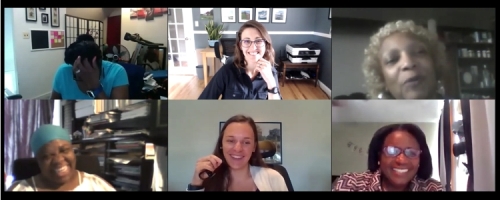Lessons Learned about Virtual Coaching through the ACRES Project
Authors: Karen Peterman, Jane Robertson Evia, Sue Allen
This is the story of a project that was in the right place, at the right time, and that might be able to benefit those of you who are faced with converting your training programs to an online format. The ACRES project (Afterschool Coaching for Reflective Educators in STEM, NSF#1713134) was funded to create virtual professional development (PD), particularly focusing on rural educators in afterschool programs and libraries. The program was designed to use Zoom (before it became a household name) to bring fully online instructional coaching to groups of educators who were unable to travel to in-person workshops. Due to the COVID-19 pandemic, we are all now in this situation. This Spotlight shares lessons learned through the ACRES external evaluation that might be applied by others who need to identify or create effective virtual PD opportunities for ISE educators.
First, what is ACRES? It is a series of virtual trainings in which a small group of educators meet synchronously online every two to six weeks with a coach to learn and practice STEM facilitation skills for leading out-of-school programs with youth. During each session, the coach teaches and models skills in the context of a hands-on activity, and participants watch sample videos of other educators using the skills. They practice sharing constructive criticism by discussing strengths and opportunities in each video. They also bring videos of their own practice to share with their training cohort.
The reflections that follow are from network and statewide directors who chose to have their staff participate in ACRES trainings over the last year.
Virtual PD that is provided synchronously, with both a coach and a consistent cohort of educators, creates a learning context that is impactful and meaningful. As we all now know, technologies such as Zoom, Google Meet and Webex provide platforms that allow colleagues to see one another, connect on a regular basis, and leverage online collaboration tools. These same tools work well for synchronous group reflection and coaching. With ACRES, cohorts comprised of staff within the same state or network were considered particularly successful for building community and trust with one another online. One director shared, I think that they feel like they have a smaller group. Like, maybe the newer agents now know some of the other agents that they might not have worked with that closely, and I think there was a level of trust that was grown.
Directors noted that staff quickly became comfortable – both as training participants and program providers – with virtual training methods. One director found that, we got comfortable using virtual tools to do hands-on STEM with people and with STEM itself at the same time. Directors shared expectations that both PD and out-of-school programming will be offered virtually or in a hybrid format in their organizations in the future. They recognized virtual coaching, learning how to interact in an online environment, and learning how to give and receive constructive feedback as skills that out-of-school programs can benefit from as they move toward a “new normal.”

A primary criterion of PD for out-of-school staff is that it is immediately applicable and adaptable to program needs. A focus on facilitation skills rather than content may be particularly suited to virtual training. Staff want to be able to take what they have learned, and quickly implement it with youth. This feedback is exemplified by a director who said, It just has to be applicable. There has to be something I can take from this training and I can directly put in, and less theoretical. Directors noted the value of virtual PD that teaches staff how to facilitate activities and not the activities themselves. One director stated, It doesn’t matter what the activity is; if we have this baseline knowledge of how to facilitate, then we can do whatever the activity is.
Successful recruitment and participation in a virtual PD program is based on an understanding of the key elements of the intervention up-front. Prior to the pandemic, it was uncommon for out-of-school PD to be both virtual and interactive. Directors noted that their interest in participating in ACRES was heightened once they understood that it created an interactive cohort that would meet regularly to allow staff to provide constructive feedback on each other’s practice, rather than being a one-off webinar.
Virtual coaching helps create equity and combats isolation.
All directors mentioned this aspect, with many sharing examples of how the virtual delivery model supported greater equity across the range of staff in their system. It ensured that training was available to all staff who had broadband internet access, and eliminated travel barriers such as distance, time, and cost. One director commented: [I saw] an opportunity to actually expand our toolbox and work with people virtually, which was a big part of what we were looking for and would be a huge help to us to reach the state. Most of our state is rural. There [are] lots of people who want PD and we can’t offer it to them because we can’t get there.
Conclusion
The ACRES components shared here provide concrete examples for consideration, particularly for practitioners who are actively searching for ways to combat isolation, strengthen collegiality, and build skills. We hope that the components and feedback shared here will provide a timely touchpoint, as informal science learning practitioners everywhere continue to flex and transition in response to the pandemic. More details about the program can be found at www.mmsa.org/acres.
Disclaimer:
This material is based upon work supported by the National Science Foundation under Grant No. 1713134. Any opinions, findings, and conclusions or recommendations expressed in this material are those of the authors and do not necessarily reflect the views of the National Science Foundation.